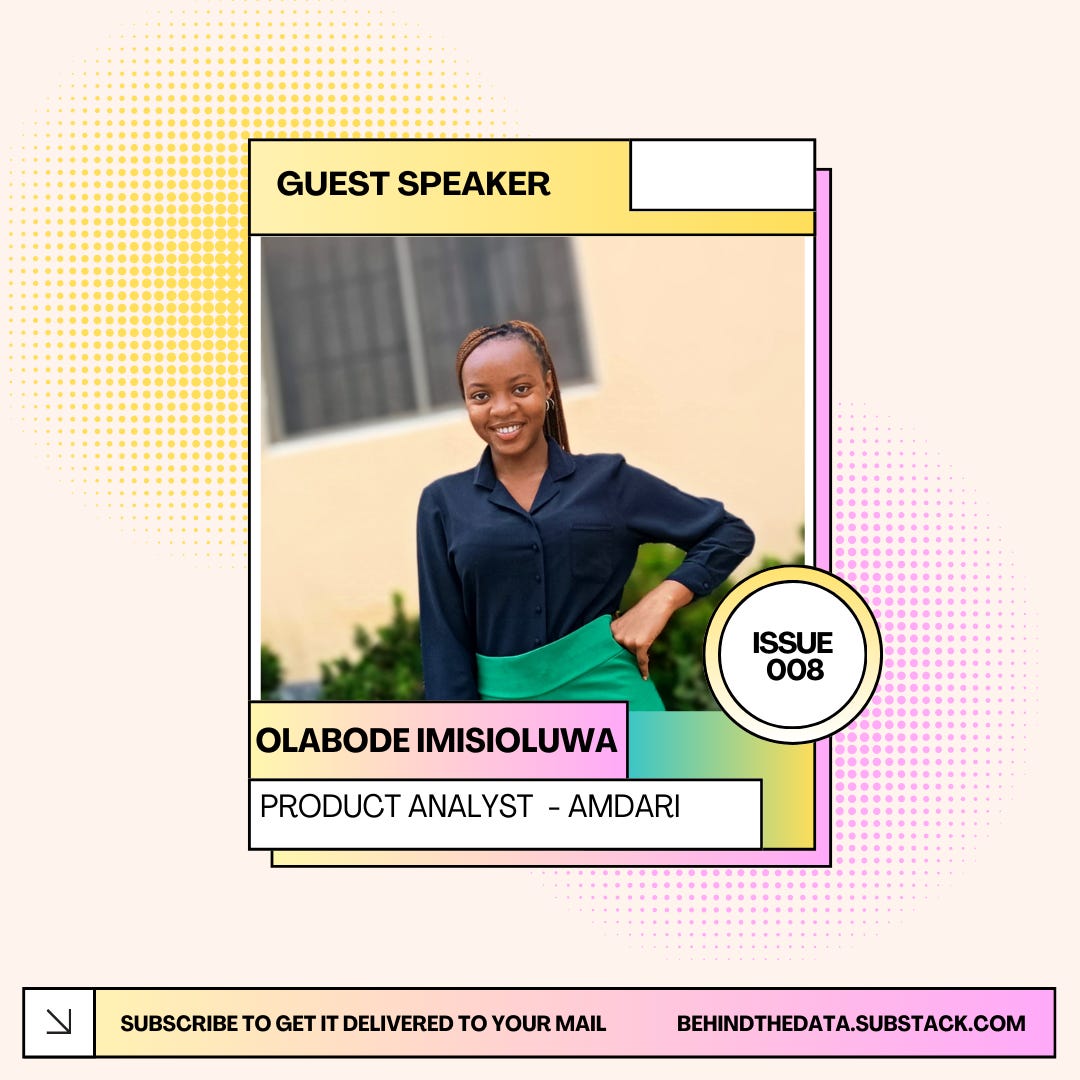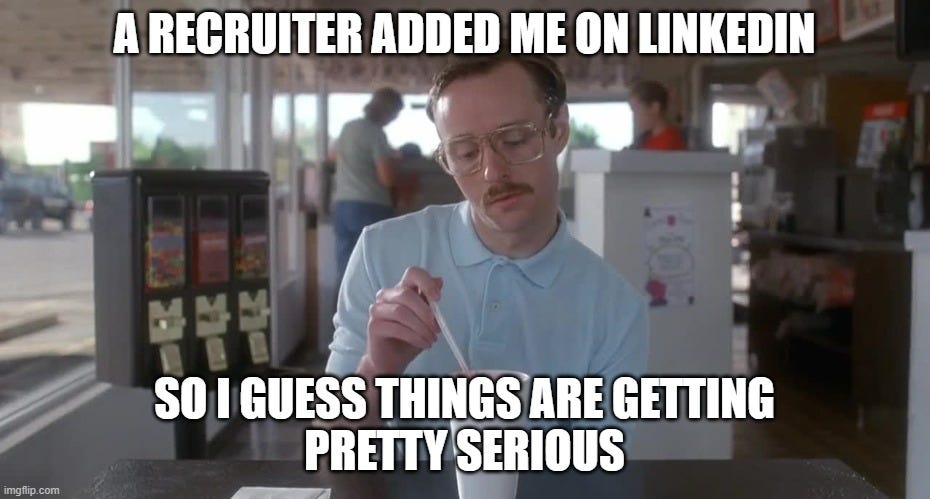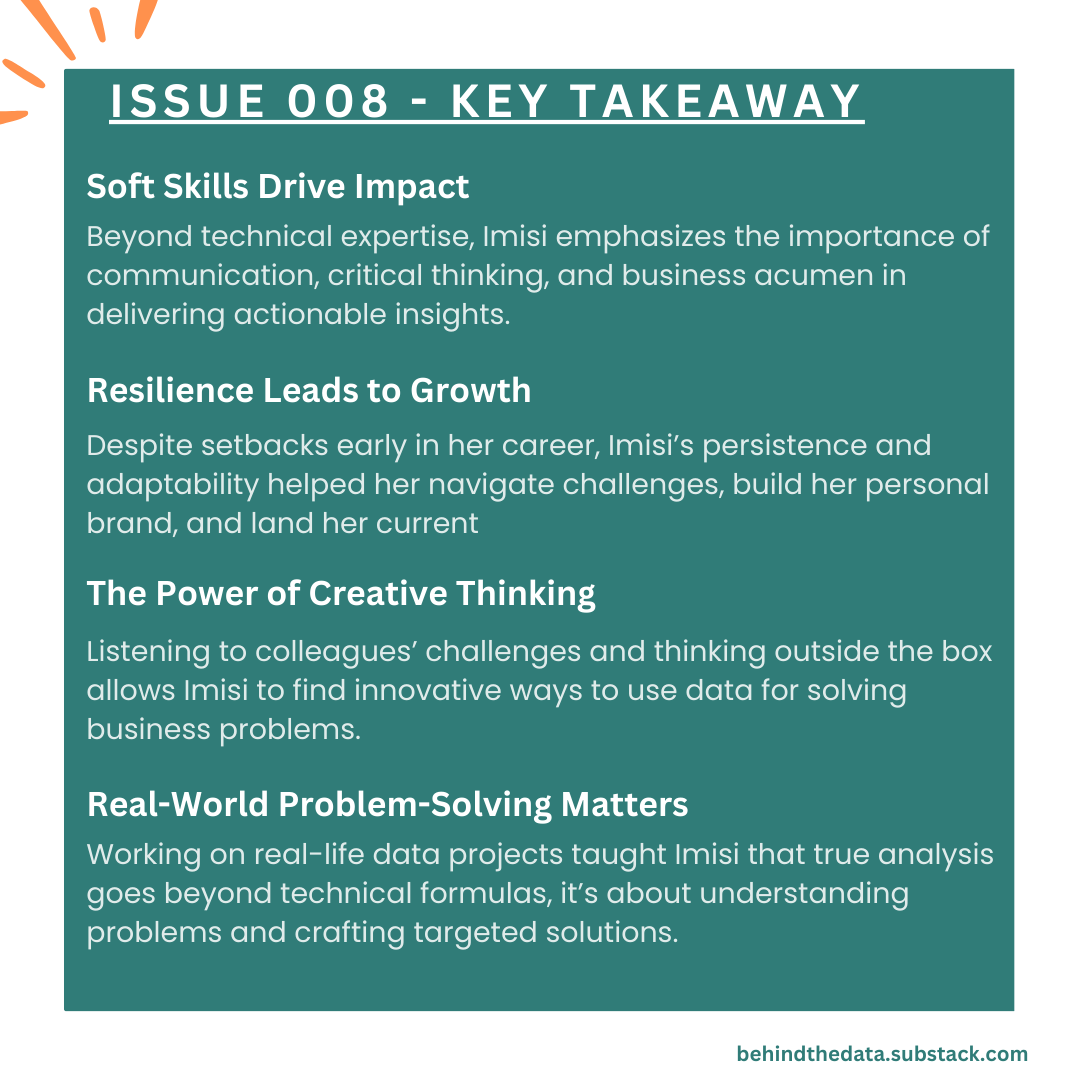Issue 008 - Meet Olabode Imisioluwa
I realized that landing a job isn’t just about technical skills but also about showcasing your work and building a personal brand.
Meet Olabode Imisioluwa, a Product Analyst at Amdari whose journey into data is fueled by a love for mathematics and statistics. After exploring various paths in tech, Imisi found her calling in data analysis, a field that combines her strengths in math with her desire to extract meaningful insights from data.
Imisi’s story is one of resilience and growth, from overcoming challenges in the job market to discovering the power of creative problem-solving in data projects.
What inspired you to pursue a career in data, and how has your motivation evolved over time?
My love for mathematics and statistics initially inspired me to pursue a career in data. After university, I knew I wanted to work in tech but wasn’t sure which path to take. Research pointed me toward data analysis, a field that aligned perfectly with my strengths in math and my passion for extracting meaning from data.
At first, I believed data analysis was all about technical skills, so I focused on learning the necessary tools. However, as I began working on real-world projects, I realized data analysis goes far beyond technical proficiency. It’s about solving meaningful business problems and creating value.
This experience taught me the importance of soft skills like communication, critical thinking, and business acumen. Today, I’m motivated not only by the technical challenges but also by the impact I can make through clear communication and actionable insights.
Can you share a pivotal moment in your career that significantly shaped your approach to data?
A pivotal moment in my career came when I participated in a data challenge hosted by Amdari. The challenge involved working on real-life projects through the Amdari platform, and it completely transformed my approach to data analysis.
Before this experience, I was focused on mastering technical skills like complex SQL queries and formulas. However, working on real-world problems helped me realize that true data analysis is about problem-solving, not just applying formulas or memorizing queries. I learned that understanding the problem and identifying the best approach is crucial, making technical solutions easier and more effective to implement.
How do you balance the technical aspects of your role with the need for creative problem-solving?
Focusing on the core problem and business goals first is how I balance the technical side of my role with creative problem-solving. This allows me to apply my technical skills in a more targeted way, ensuring they directly address the challenges at hand.
I also prioritize listening to my colleagues’ ideas and understanding the challenges their departments face. Their insights often spark new ways to use data creatively to solve real issues.
Can you discuss a project where data insights led to unexpected outcomes or revelations?
One memorable project was my first marketing analytics project, where I analyzed ad performance across Facebook, Google, and Instagram. I initially expected Google Ads to have the highest conversion rate, but the data revealed a different story. While Google Ads had a higher return on ad spend (ROAS), Instagram outperformed it in terms of conversion rates.
This was surprising because I assumed higher ROAS would directly correlate with higher conversions. A deeper analysis showed that Instagram’s visually engaging ads were more effective at converting users in the consideration phase, while Google Ads, despite its broader reach, had lower conversion rates due to greater competition and less targeted intent.
How do you foster a culture of data-driven decision-making within your team or organization?
I do this by recommending the collection of valuable data from our customers to gain a deeper understanding of their pain points, how they discovered our brand, and other key factors that can help us better target our ads.
By gathering insights directly from users, we can refine our marketing strategies and make data-driven decisions to engage with our audience more effectively. I also encourage my team to prioritize customer feedback and data throughout all stages of decision-making, ensuring that we continuously adapt and evolve based on real user insights.
What role does mentorship play in your career, and how have mentors influenced your journey?
While I haven’t had a one-on-one mentor, being part of a community with access to multiple mentors has been incredibly valuable. Hearing about their experiences and how they overcame mistakes has taught me a lot.
What stands out most is how they bounce back after failure. This has helped me see failure not as something to fear but as an opportunity to learn and grow. Adopting this mindset has had a profound impact on my career, allowing me to approach challenges with resilience.
Can you reflect on a setback in your data career and what you learned from it?
A: Early in my data career, I struggled with the job search after completing my training program. I faced numerous rejections and was even ghosted by recruiters, which made me question whether I was on the right path. This experience taught me the importance of persistence and visibility.
I realized that landing a job isn’t just about technical skills but also about showcasing your work and building a personal brand. I became more active on LinkedIn, sharing my projects and insights, which eventually led to my current role at Amdari. This setback reinforced the idea that challenges are opportunities to refine your approach and grow stronger.
If you have a recommendation for who we should be speaking to, or who you would like to see in this interview series, reply with their names, data specialty, and how we can reach them (LinkedIn, Email, Phone, X Handle)
What are some key skills that are often overlooked in your field of data?
Communication, business acumen, and critical thinking are often overlooked in data analysis. While technical skills are important, the ability to communicate insights clearly and connect them to business goals is what truly drives impact.
What do you love outside of data?
Outside of data, I love watching movies. It helps me relax and explore different perspectives and cultures.
What resources (books, courses, tools) do you recommend for people to level up their skills?
DataCamp: A beginner-friendly platform that simplifies complex concepts.
Real-world projects – Working on actual business problems provides invaluable hands-on experience. Check out Amdari.io
Have you ever faced challenges breaking into or growing in the data field? I mean, who hasn’t, right? I’m collecting stories for an upcoming Behind the Data issue. Share your journey here, we'd love to read about you!
To connect with Imisi and learn more about her work, feel free to reach out to her on LinkedIn at Olabode Imisioluwa.
Best,
Ayoade Adegbite
Creator of Behind the Data












